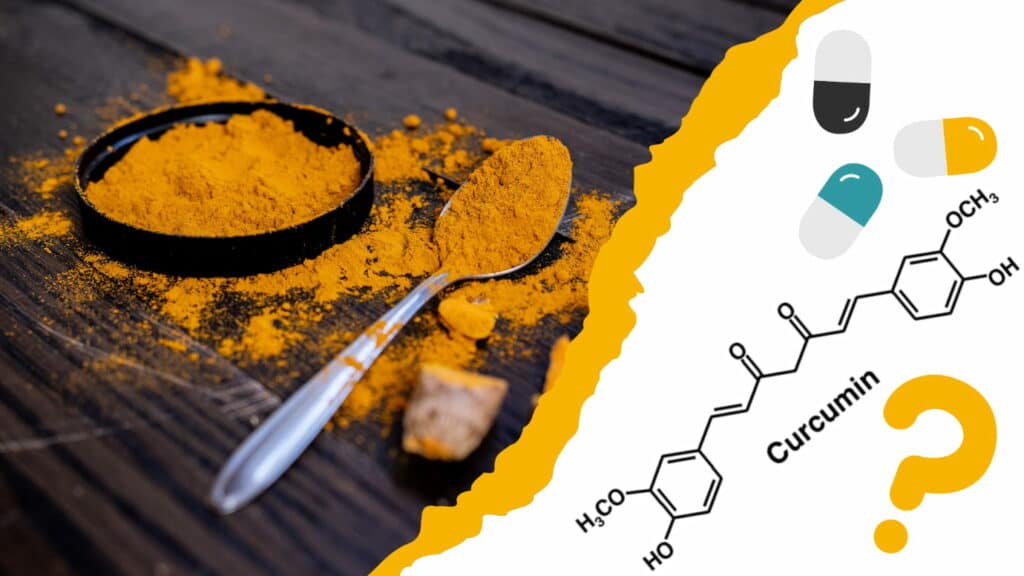Turmeric is a spice that is widely used in Asian cuisines and traditional medicine, prized for its deep orange-yellow colour and health benefits.
The main active ingredient of turmeric, curcumin, has powerful antioxidant effects and has been linked to many health benefits, though many of these overlap with turmeric.
So, which is better, turmeric or curcumin, and does extracting curcumin from turmeric deprive it of some of turmeric’s health benefits?
Commonly found in tasty curries and traditional Ayurvedic medicine, turmeric is usually dried and powdered for use as a spice, dye, or supplement. Although you are more likely to find turmeric in food and drink these days, it was historically used in religious festivals and as a clothing dye because of its striking colour.
One of the main active compounds in turmeric is curcumin, which was named in 1815 when Vogel and Pierre Joseph Pelletier discovered a “yellow colouring-matter” from turmeric root. Scientists have speculated that curcumin causes many of the reported health benefits from turmeric, but it’s still unclear which is better turmeric or curcumin.
Table of Contents
What Are Turmeric and Curcumin?
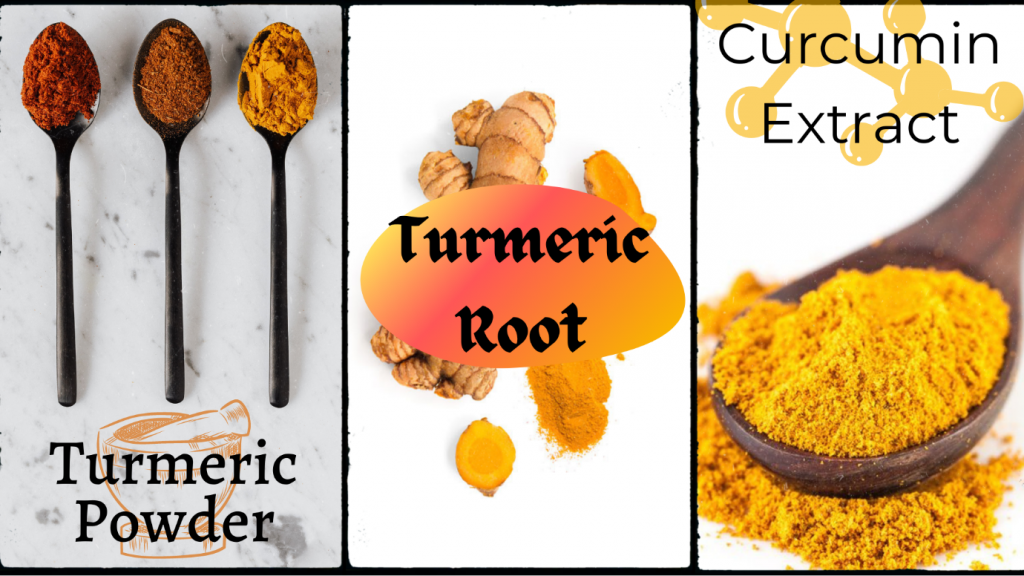
Turmeric comes from the root of Curcuma Longa, a perennial, flowering plant native to India and Southeast Asia that is in the same botanical family as ginger. Although it is often sold as a spice in dry powder form, fresh turmeric looks like ginger with intensely yellow-orange coloured flesh.
Turmeric is rich in organic compounds, but one group – curcuminoids – has been shown to have beneficial effects on cognitive functions and osteoarthritis. However, when extracting Curcumin from Turmeric you miss out on the other compounds in turmeric, causing debate on which is better turmeric or curcumin.[vc_row][vc_column][vc_column_text]
Health Benefits of Turmeric and Curcumin
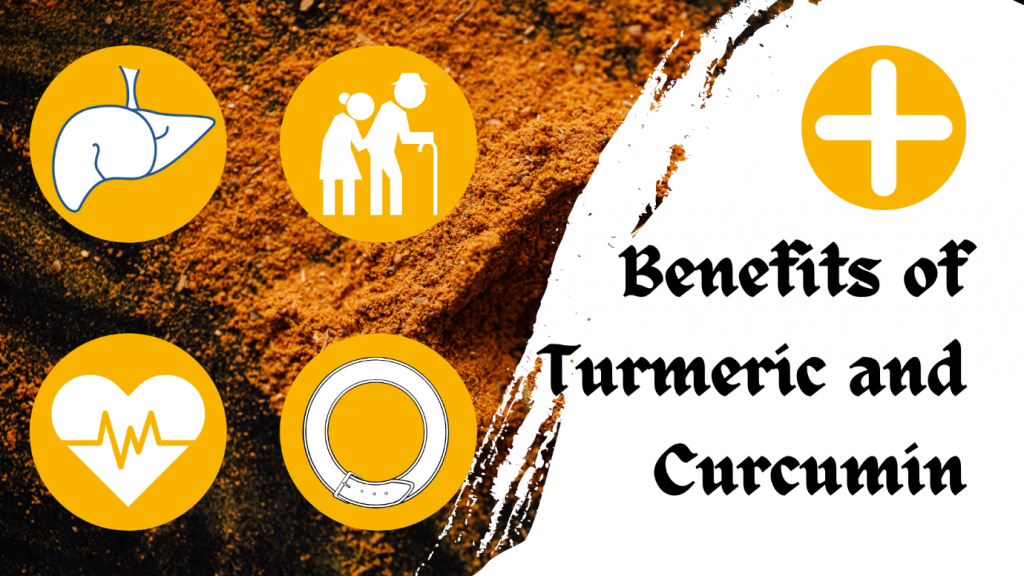
Because curcumin is just one of the beneficial compounds found in turmeric, many of the health benefits of curcumin can also be attributed to turmeric and vice versa. In the debate over which is better turmeric or curcumin, it can be hard to prove which benefits are specific to turmeric and which are due to the curcumin content of turmeric.
Both turmeric and curcumin have a wide variety of systemic health benefits, so before we dive into the nitty-gritty of which is better turmeric or curcumin, here are a number of areas where both have shown clear benefits:[/vc_column_text][vc_row_inner el_class=”icon-box-styles icon-box-half-br-1″][vc_column_inner][icon_box icon_position=”left” border=”0″ title=”Osteoarthritis” image=”1998″]Turmeric compounds (including curcumin) can tackle markers of inflammation and reduce symptoms of osteoarthritis.[/icon_box][icon_box border=”0″ title=”Obesity” image=”1999″]Turmeric and curcumin may help to regulate body fat by regulating the inflammatory pathway involved with obesity.[/icon_box][icon_box icon_position=”left” border=”0″ title=”Heart Disease” image=”2000″]Both curcumin and turmeric can lower triglycerides and “bad” LDL cholesterol and therefore reduce the risk of heart disease.
[/icon_box][icon_box border=”0″ title=”Diabetes” image=”2001″]Curcumin and turmeric can improve blood sugar metabolism and tackle insulin resistance, potentially reducing the effects of diabetes.[/icon_box][icon_box icon_position=”left” border=”0″ title=”Liver Damage” image=”2002″]Thanks to their antioxidant effects, turmeric and curcumin may protect against chronic liver damage by reducing oxidative stress.[/icon_box][icon_box border=”0″ title=”Cancer” image=”2003″]Although there is very little conclusive evidence, some research has found that curcumin and turmeric may reduce the activity of cancer cells.[/icon_box][icon_box icon_position=”left” border=”0″ title=”Antifungal” image=”2004″]Turmeric and curcumin could be used to treat fungal infections as they disrupt fungal cell membranes and may complement fungal medication.[/icon_box][icon_box border=”0″ title=”Antibacterial” image=”2006″]Both turmeric and curcumin boast strong antibacterial effects and can reduce the growth of a wide variety of harmful bacteria.[/icon_box][/vc_column_inner][/vc_row_inner][/vc_column][/vc_row][vc_row][vc_column][vc_column_text]
Health Benefits of Turmeric

Because turmeric contains a variety of plant compounds – including curcumin – it may offer some health benefits that curcumin doesn’t. However, despite the long history of turmeric in medicine, there are still not enough comparative studies to categorically say which is better turmeric or curcumin.
For example, one study examining the antifungal effects of turmeric found that all eight of its active components were able to suppress fungal growth. This study found that the curdione content of turmeric had the best results, though it was even stronger when combined with the other seven compounds, seemingly showing that turmeric may be better than curcumin alone for this purpose.
Not only is turmeric effective at inhibiting fungal growth, it may also protect your body as you age, showing promise in the treatment of Parkinson’s disease and arthritis. However, turmeric doesn’t reign supreme in the treatment of every condition, so let’s see what curcumin can bring to the debate over which is better turmeric or curcumin…
Also Read: vitamins b12 for weight loss
Health Benefits of Curcumin
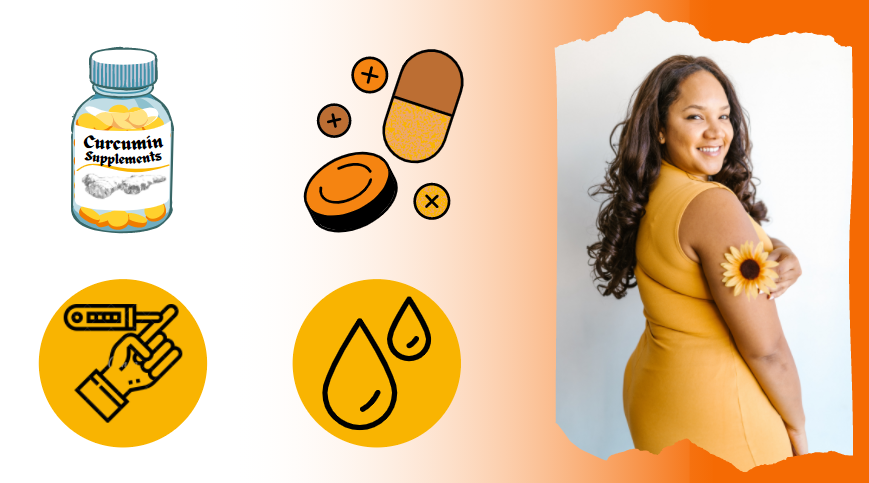
Curcumin is widely considered the most active ingredient in turmeric, which is why numerous researchers have begun to isolate and examine the health benefits of curcumin alone. Much like turmeric, curcumin has strong anti-inflammatory and antioxidant effects, even speeding up the healing process thanks to its anti-bacterial and anti-fungal effects.
While both turmeric and curcumin have been shown to reduce blood sugars in type 2 diabetes, one study found that curcumin was better at minimizing diabetes symptoms. Curcumin extracts are also able to lower inflammatory markers which contribute to type 2 diabetes, meaning one more point in the battle of which is better turmeric or curcumin.
Unfortunately, curcumin is often poorly absorbed and may pass through your digestive system undigested, though this can be avoided by adding black pepper to your diet. Either way, research shows that curcumin is better than turmeric at tackling certain conditions (though not everything), leaving the question of which is better turmeric or curcumin open ended…[/vc_column_text][vc_column_text]
Which is Better – Turmeric of Curcumin?
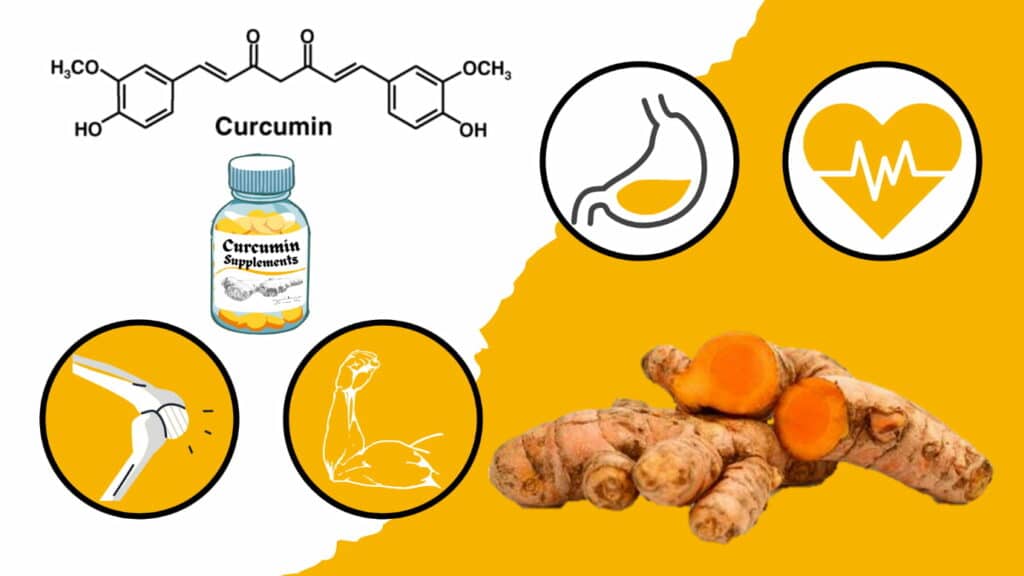
Currently, there is no official consensus on whether turmeric or curcumin supplements are better for you, though the answer depends on what you want from these supplements. When discussing which is better turmeric or curcumin, you should always consider your needs:[/vc_column_text][/vc_column][/vc_row][vc_row el_class=”icon-box-styles icon-box-bottom-br-1 icon-box-bottom-br-3″][vc_column][vc_row_inner equal_height=”yes” el_class=”yellow-box-style-1″][vc_column_inner width=”1/4″][vc_single_image image=”636″ img_size=”large” alignment=”center”][vc_column_text]For arthritis, taking 1 gram of curcumin a day may reduce your symptoms in 8-12 weeks, which is great news for older people and those suffering from joint pain.[/vc_column_text][/vc_column_inner][vc_column_inner width=”1/4″][vc_single_image image=”639″ img_size=”large” alignment=”center”][vc_column_text]If you are conscious of your cholesterol levels, taking 700mg of turmeric extract twice daily may lower your cholesterol, especially when taken as part of a healthy lifestyle.[/vc_column_text][/vc_column_inner][vc_column_inner width=”1/4″][vc_single_image image=”640″ img_size=”large”][vc_column_text]For athletes and physically active people, curcumin and piperine (found in black pepper) extracts may reduce muscle damage after exercise, helping you recover quicker.[/vc_column_text][/vc_column_inner][vc_column_inner width=”1/4″][vc_single_image image=”641″ img_size=”large”][vc_column_text]While curcumin and turmeric are well-tolerated and have been tested at high doses (of up to 12 grams daily!), they may cause some side effects like nausea.[/vc_column_text][/vc_column_inner][/vc_row_inner][vc_column_text]In summary, my answer to the question of which is better turmeric or curcumin is “it depends”. Sure, turmeric is a great all-rounder thanks to the many plant compounds it brings to the table, curcumin has powerful results for specific issues such as muscle fatigue and arthritis.
It’s also worth noting that turmeric is an all-natural supplement that can be enjoyed fresh, dried or mixed into any number of oils and tinctures, making it more versatile and widely available than curcumin extract. Whether you sip on a turmeric-infused coffee or add a splash to your evening meal, this spice can be enjoyed in all kinds of ways.
Contrastingly, if you seek out curcumin extract, make sure to choose a supplement that has been clinically tested and conforms to industry best practices, so that you get a pure, safe, and effective product. Even if you disagree with my opinions of which is better turmeric or curcumin, make sure to get a quality product and ask your doctor if you’re taking either to address a serious health concern such as diabetes.[/vc_column_text][/vc_column][/vc_row]
